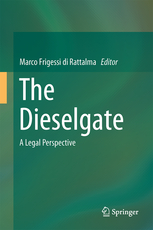CCEWP NEWS
- 2017 - NEW BOOK - The Dieselgate - A Legal Perspective Ed. Marco Frigessi di Rattalma
Following the successful collaboration of the CCWP with the AIDA Motor Insurance WP and the AIDA Civil Liability WP at our Paris meeting in December 2015 and following our further recent discussions in Vienna AIDA CCEWP Vice Chair, Marco Frigessi di Rattalma is busy editing a book for publication in 2017 called, "The Dieselgate - A Legal Perspective " (http://www.springer.com/gp/book/9783319483221).

The publisher's description of the work reads:
This book explains, compares and assesses the legal implications of Dieselgate within a range of selected jurisdictions and at the EU, international and comparative law level. The book analyses the US EPA-VW $14.7bn dollar settlement of 2016, one of the largest civil settlements in the history of environmental law. As it shows, the Dieselgate affair has raised a host of issues concerning corporate and social responsibility, tort liability, environmental liability, contractual defective products, warranty, and false environmental claims in a range of jurisdictions. Issues like repurchasing or retrofitting cars from consumers and making direct payments to consumers through car buy-backs and compensation are analysed. Further, the book relates how Dieselgate has also contributed to the discussion about the introduction of more effective collective measures of redress for consumers, such as class actions, in Germany, France, Italy and the UK.
The book subsequently reviews the criminal offences Volkswagen is currently confronted with in Germany, France and Italy, i.e. fraud and manipulation of capital markets (by belatedly providing shareholders with essential information relevant for the share value), and, potentially, environmental crimes. It demonstrates how Dieselgate has sparked new debates in Germany, Italy, France and the UK about the need to introduce enterprise liability for organised crimes, lack of compliance and control structures, and intentional violations of the law. Lastly, the book discusses how EU law has sought to respond to Dieselgate and thus investigates the controversial EU Regulation No. 2016/646 introducing a "temporary conformity factor" of 2.1 (equivalent to a 110% increase on the current limit) to be applied for NOx in the new RDE testing cycle, and the works of the EU committee of inquiry into Emissions Measurements in the Automotive (EMIS).
oOo
- NEW ZEALAND INSURANCE LAW ASSOCIATION (NZILA) ANNUAL CONFERENCE - QUEENSTOWN - 21-23 SEPTEMBER 2016

Tim Hardy (UK) and Chris Rodd (Australia) of the CCEWP were invited to make presentations to the NZILA 2016 Annual Conference in Queenstown as Keynote Session Speakers on the topic of “Climate Change: the insurance industry’s current and future roles”, following Dr Jan Wright, the NZ Parliamentary Commissioner for the Environment.
Over 300 delegates attended what was the principal event of the year for an association witnessing a large upturn in interest and activity in the aftermath of the claims, legal and coverage issues still emanating from the Christchurch earthquakes. The venue facilities, programme and resulting Press coverage were all most impressive.
Presentation materials are to be accessed on the links below and also upon the NZILA website: http://www.nzila.org/.
Press coverage of the presentations
"Climate change is the mother of all risks, NZ parliamentary environment commissioner Dr Jan Wright told the NZ Insurance Law Association conference in Queenstown, NZ, last week. Sea levels were already rising but there was time to plan and "you can't rush in with a heavy hand because that creates communities of climate change deniers". She said insurers had to be involved in the process because they were "first in the firing line". Wright warned coastal properties might become uninsurable but said insurers had to work with banks because coastal properties still had mortgages and needed coverage. Australian policies generally did not cover "actions of the sea, [but] it's different in NZ". It was hard to avoid "tension and distress" for people whose homes were vulnerable but the commission had mapped low-level NZ coastal areas to show residents their homes' vulnerability. The maps showed 13,000 NZ buildings were in areas less than 50cm above spring high tide levels. Christchurch had "very serious" problems because earthquakes had caused some land to sink more than 1m. Wright said new developments should be at least 2m above spring high tide elevations."

Climate Change "shifts insurers" - Climate change takes insurers outside the traditional "law of large numbers" philosophy, Tim Hardy, AIDA (International Insurance Law Association) Climate Change Working Party Chair, told the NZILA conference. Insurers were asked to bear the risk but also to finance adaptation. "It's hard to assess the risks on a traditional basis. Past statistics won't necessarily reflect future risks." Hardy said it was broader than property risks. As the burden of responsibility shifted, there was potential liability for failure to mitigate and adapt. "Global rhetoric is often at odds with reality." There were many good intentions, provided "someone else pays". Hardy said individual responses to climate change were often ahead of the government and corporate sectors. AIDA's climate change working party was trying to gather insurers' wordings to assess how they responded to climate change risks but it was “slightly frustrating” that it was hard to get the documentation. “I understand commercial sensitivities and the difficulties of pooling knowledge and expertise but we need a positive response from the market to identify the problems and seek solutions”, Hardy said. Some carriers had conducted research and encouraged policyholders to make themselves more resilient. Sharing data with local authorities was “a necessary step, despite anxieties”. Some insurers were reluctant to increase premiums for vulnerable properties because it affected their income streams. “Wide, imaginative global collaboration is required”, Hardy said.“Climate Change is too often consigned to the ‘too difficult’ box.”

Tim Hardy’s presentation may be accessed here.
Flood mitigation "needs funding" - Australia allocates insufficient funding to flood risk mitigation, industry consultant and Australia's AIDA representative Chris Rodd told the NZILA conference. He said in 2012-13, the Queensland Government allocated only $41.9m for four programs and the Federal Government allocated $104.4m over four years. But the Federal Government spent $9bn to rebuild Queensland after the 2010-11 floods. Too many areas remained vulnerable and there was a high reliance on emergency procedures. Insurance pricing was "a race to the bottom for the basic product". Aggregators were driving prices down and there was a plethora of cheap products with limited flood cover. But it remained unaffordable for those living on flood plains or in cyclone zones.

Chris Rodd’s presentation may be accessed here.
|
